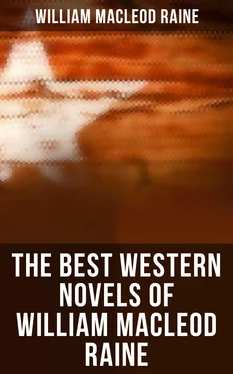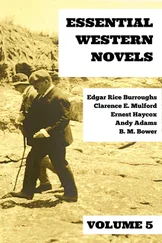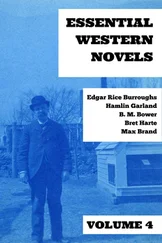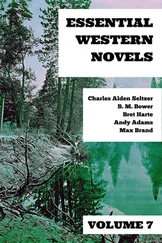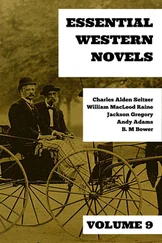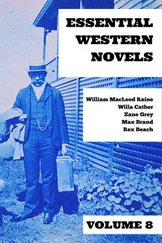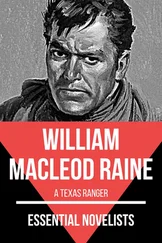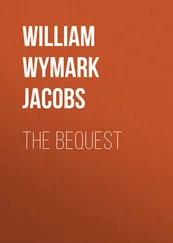"For God's sake, let me alone! I've had enough," he groaned.
"Sure of that?"
"You've pretty near killed me."
Larrabie laughed grimly. "You didn't get half enough. I'll listen to that apology now, my friend."
With many sighs, the prostrate man came through with it haltingly. "I didn't mean—I hadn't ought to have said——"
Keller interrupted the tearful voice. "That'll be enough. You will know better, next time, how to speak respectfully of a lady. While we're on the subject, I don't mind telling you that nobody told me. I'm not a fool, and I put two and two together. That's all. I'm not her brother. It wasn't my business to punish you because you played the coyote. But when you said she lied to me, that's another matter."
For very shame, trampled in the dust as he had been, Tom could not leave the subject alone. Besides, he had to make sure that the story would be kept secret.
"The way of it was like this: After I shot Buck Weaver, we saw they would kill me if I was caught; so we figured I had better hunt cover. 'Course I knew they wouldn't hurt a girl any," he got out sullenly.
"You don't have to explain it to me," answered the other coldly.
"You ain't expecting to tell the boys about me shooting Buck, are you?" Dixon asked presently, hating himself for it. But he was afraid of Phil and his father. They had told him plainly what they thought of him for leaving the girl in the lurch. If they should discover that he had done the shooting and left her to stand the blame for it, they would do more than talk.
"I certainly ought to tell them. Likely they may want to see you about it, and hear the particulars."
"There ain't any need of them knowing. If Phyl had wanted them to know, she could have told them," said Tom sulkily. He had got carefully to his feet, and was nursing his face with a handkerchief.
"We'll go and break our news together," suggested the other cheerfully. "You tell them you think Weaver is in her room, and I'll tell them my little spiel."
"There's no need telling them about me shooting Weaver, far as I can see. I'd rather they didn't know."
"For that matter, there's no need telling them your notions about where Buck is right now."
Tom said nothing, but his dogged look told Larrabie that he was not persuaded.
"I tell you what we'll do," said Keller, then: "We'll unload on them both stories, or we won't tell them either. Which shall it be?"
Dixon understood that an ultimatum was being served on him. For, though his former foe was smiling, the smile was a frosty one.
"Just as you say. I reckon it's your call," he acquiesced sourly.
"No—I'm going to leave it to you," grinned Larrabie.
The man he had thrashed looked as if he would like to kill him. "We'll close-herd both stories, then."
"Good enough! Don't let me keep you any longer, if you're in a hurry. Now we've had our little talk, I'm satisfied."
But Dixon was not satisfied. He was stiff and sore physically, but mentally he was worse. He had played a poor part, and must still do so. If he went down to the ranch with his face in that condition, he could not hope to escape observation. His vanity cried aloud against submitting to the comment to which he would be subjected. The whole story of the thrashing would be bound to come out.
"I can't go down looking like this," he growled.
"Do you have to go down?"
"Have to get my horse, don't I?"
"I'll bring it to you."
"And say nothing about—what has happened?"
"I don't care to talk of it any more than you do. I'll be a clam."
"All right—I'll wait here." Tom sat down on a boulder and chewed tobacco, his head sunk in his clenched palms.
Keller walked down the trail to the ranch. He was glad to go in place of Dixon; for he felt that the young man was unstable and could not be depended upon not to fall into a rage, and, in a passionate impulse, tell all he knew. He saddled the horse, explaining casually to the wrangler that he had lost a bet with Tom, by the terms of which he had to come down and saddle the latter's mount.
He swung to the back of the pony and cantered up the trail. But before he had gone a hundred yards, he was off again, examining the hoofmarks the animal left in the sand. The left hind mark differed from the others in that the detail was blurred and showed nothing but a single flat stamp.
This seemed to interest Keller greatly. He picked up the corresponding foot of the cow pony, and found the cause of the irregularity to be a deformity or swelling in the ball of the foot, which apparently was now its normal condition. The young man whistled softly to himself, swung again to the saddle, and continued on his way.
The owner of the horse had his back turned and did not hear him coming as he padded up the soft trail. The man was testing in his hand something that clicked.
Larrabie swung quietly to the ground, and waited. His eyes were like tempered steel.
"Here's your horse," he said. Before the other man moved, he drawled: "I reckon I'd better tell you I'm armed, too. Don't be hasty."
Dixon turned his swollen face to him in a childish fury. He had picked up, and was holding in his hand, the revolver Larrabie had taken from him and later thrown down. "Damn you, what do you mean? It's my own gun, ain't it? Mean to say I'm a murderer?"
"I happen to know you have impulses that way. I thought I'd check this one, to save you trouble."
He was standing carelessly with his right hand resting on the mane of the pony; he had not even taken the precaution of lowering it to his side, where the weapon might be supposed to lie.
For an instant Tom thought of taking a chance. The odds would be with him, since he had the revolver ready to his fingers. But before that indomitable ease his courage ebbed. He had not the stark fighting nerve to pit himself against such a man as this.
"I don't know as I said anything about shooting. Looks like you're trying to fasten another row on me," the craven said bitterly.
"I'm content if you are; and as far as I'm concerned, this thing is between us two. It won't go any further."
Keller stood aside and watched Dixon mount. The hillman took his spleen out on the horse, finding that the safest vent for his anger. He jerked its head angrily, cursed it, and drove in the spurs cruelly. With a leap, the cow pony was off. In fifty strides it reached the top of the hill and disappeared.
Keller laughed grimly, and spoke aloud to himself, after the manner of one who lives much alone.
"There's a nice young man—yellow clear through. Queer thing she could ever have fancied him. But I don't know, either. He's a right good looker, and has lots of cheek; that goes a long way with girls. Likely he was mighty careful before her. And he'd not been brought up against the acid test, then."
His roving eyes took in with disgust the stains of tobacco juice plastered all over the clean surface of the rocks.
"I'll bet a doughnut she never knew he chewed. Didn't know it myself till now. Well, a man lives and learns. Buck Weaver told me he came on a dead cow of his just after the rustlers had left. Fire still smoldering. Tobacco stains still wet on the rocks. And one of the horses had a hind hoof that left a blurred trail. Surely looks like Mr. Tom Dixon is headed for the pen mighty fast."
He turned and strolled back to the house, smiling to himself.
Chapter XIV
A Difference of Opinion
Table of Contents
Breakfast finished, Weaver cast about for some diversion to help him pass the time.
This room, alone of those he had seen in the house, seemed to reflect something of the teacher's dainty personality. There were some framed prints on the walls—cheap, but, on the whole, well selected. The rugs were in subdued brown tints that matched well the pretty wall paper. To the cattleman, it was pathetic that the girl had done so much with such frugal means to her hand. For plainly her meagre efforts were circumscribed by the purse limitation.
Читать дальше
